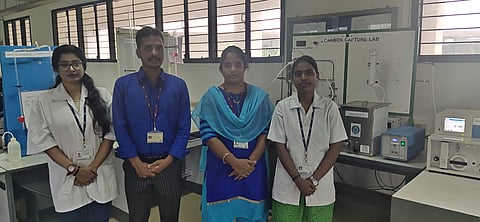

One of the largest contributors to global warming is carbon emissions, which is most prevalent in industries that burn coal to generate power. The fossil fuel power plants are among the largest contributors. While technologies like Carbon Capture, Utilization and Storage (CCUS), which stores carbon dioxide and prevents it from escaping into the atmosphere, have been widely recognised as a method to reduce carbon emissions, it does consume a lot of power. A few researchers at SSN College of Engineering, however, have come up with a solution to this problem. But before understanding how the solution is being provided, it is essential to understand the problem. Dr Ambedkar Balraj, Associate Professor at SSN College of Engineering, explains.
In a conventional set-up, the emissions from a power plant — flue gas — go through multiple tanks before being released. "A reboiler is used to heat it to high temperatures. This uses almost 40% of the power generated in the first place. The process is called carbon stripping where the solvent is exposed to high temperature and pressure. While carbon dioxide is separated, it also leads to solvent degradation," explains Balraj. The technology developed by SSN researchers, including Balraj, manages to remove the carbon dioxide and also does so with minimal solvent loss.
But how do they do it? The technology is called mega sonic, where a 1 MHz tank is used for the carbon stripping process. "This not only leads to effective carbon stripping, but it is really cost-effective. Moreover, temperatures of only 43 degrees Celsius will be enough to complete the process," says Balraj. This technique is called the Solvent-Based Post-Combustion CO2 Capture Process (PCCC) and laboratory-level experiments have been completed at the Carbon Capture Lab at SSN. "While the costly conventional process has limited use globally due to high maintenance costs as well, this process requires low maintenance and also makes better solvent regeneration possible.
Aside from Balraj, two other research scholars — R K Nilavuckkarasi and P Muthumari — were also involved in this research. Another Associate Professor at SSN, Dr J Dhanalakshmi, was also a part of the project. It has been developed over a period of three years. An industrial pilot project is also being planned. "The technology can be used across several industries like petroleum, cement, food and fertilisers. Around 70% of the world's energy supply is met with burning coal and this technology will be needed there," concludes Balraj.
